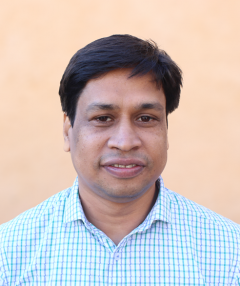Mohammad Shahidul Islam
Project: Long-term effects of Respiratory Syncytial Virus (RSV) infection in young infants (Embedded PhD project)
PhD overview
- Acute or chronic: Acute
- Country: Bangladesh
- Based at: Child Health Research Foundation
- Start date: 01 April 2018
- End date: 30 March 2021
- Supervisors: Harish Nair, Steve Cunningham, Samir K Saha
- Email: shahidul.islam@ed.ac.uk

Background
Respiratory syncytial virus (RSV) is the most common cause of childhood illness that attacks the lower respiratory tract and can lead to bronchitis and pneumonia. In addition, this pathogen is associated with recurrent wheeze and childhood asthma.
The burden of RSV-Lower Respiratory Tract Infection in infants aged 0-5 months is up to 10x higher in low- and middle-income countries. Collecting clinical samples from young infants and the lack of an appropriate diagnostic to detect RSV virus are the major obstacles to study the impact of RSV infection in developing countries. Thus, we know little about the long-term effects of RSV infection in infants in developing health care systems.
We hypothesise that the long-term effect of RSV infection on the development of wheeze/asthma will be similar to that already demonstrated in developed health care settings, and possibly potentiated given that many infants in the developing countries get the infection within 60 days of age while the lungs remain premature.
Aim and impact
To determine the long-term effects of RSV infection in young infants. A large study was recently conducted to attribute the aetiology of young infant infection in South Asia, which identified a significant number of young infants with RSV infection. We would like to revisit those infants who are currently aged between 5 to 7 years old to measure the prevalence of asthma, assess lung function and child physical development.
This is part of a wider RESPIRE project investigating the consequence of RSV infection in young infants.
Data from this study will help us appreciate the implications of introducing an RSV vaccine when it becomes available. These efforts may save the lives of young children in the future and improve their quality of life.
Find out more about the wider RSV project
About me
My academic qualifications include an MSc in Microbiology from the University of Dhaka and a Masters in Public Health from the Johns Hopkins University. My research work has been interspersed by working at different places including icddr,b, Johns Hopkins University and Child Health Research Foundation where I have played an active role in coordinating and leading several health research projects. Notably, I coordinated the Aetiology of Neonatal Infection in South Asia (ANISA) study. In 2019, I have received the most prestigious scientific award of CDC—the Charles C. Shepard Science Award (Assessment category) for publishing my research findings in the Lancet journal. Through my research, I want to link the communicable and non-communicable diseases.
Three-Minute Thesis-Style Video Competition
For the RESPIRE ASM Showcase on the 24th November 2020, the RESPIRE PhD students recorded videos explaining their research, as part of a Three-Minute Thesis-Style Video Competition. Watch Shahidul's presentation below.
- Video: ISLAM, Shahidul
- RESPIRE 3-Minute Thesis-Style Video Competition - ISLAM, Shahidul - The long-term effect of respiratory syncytial virus (RSV) infection in young children

